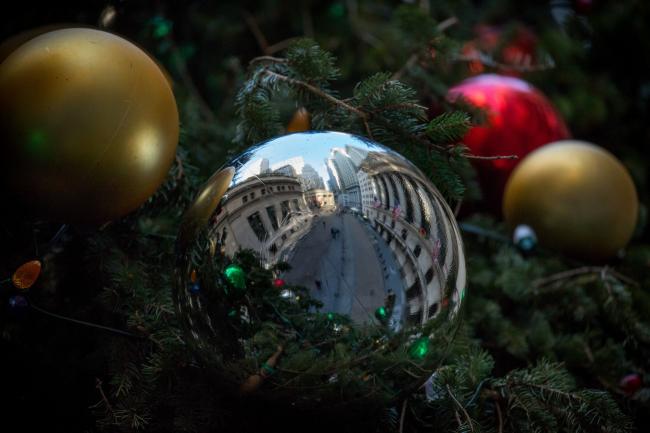This post was originally published on this site
https://i-invdn-com.akamaized.net/content/pic34ad443ec12612dae5ea1e3ac1bd4870.jpg
(Bloomberg) — Steve Chiavarone was rethinking his gift list.
It was the night before Christmas last year, the worst moment of Wall Street’s bleakest holiday season in decades. Staring at another 400-plus-point plunge in the , its fifth in seven days, the Federated Investors fund manager worried he’d been too generous with presents for the kids.
“Market’s going the wrong way and you’re worried. ‘Hey, did I spend too much?”’ said Chiavarone, whose firm has around $530 billion in client assets. “The Christmas goose didn’t taste as good that night.”
Holidays are supposed to be a time of peace. Last year, they offered a glimpse of the apocalypse. American equities careened toward their worst December since the Depression. Down 1,655 points the week before, the Dow plunged 653 more by the 1 p.m. close Christmas Eve, ruining everyone’s mood.
In the end, it all turned out to be a giant buying opportunity — stocks went straight up when markets reopened. But for people managing money on Christmas 2018, it’s a trauma they won’t soon forget. The slid to its lowest point in 19 months, with $600 billion in market value erased. The biggest four-day slump in more than three years had just happened and nothing suggested it was over.
“My thought was that I’m glad the market’s closing early today,” said David Sowerby, a portfolio manager at Ancora Advisors. After the day ended, “I did what any self-respecting portfolio manager would do. I went to the gym to work out and relieve some stress.”
Threats were everywhere. You had Donald Trump railing against the Federal Reserve. The government was shut down. Uncertainty over economic growth was rampant. News that the president was privately mulling firing Fed Chairman Jerome Powell sent anxiety swirling. At one point, Treasury Secretary Steve Mnuchin got on the phone with Wall Street banks, checking on their liquidity and infrastructure. It was supposed to restore calm but just made everything worse.
For a day. It was tough to see, but stocks were offering some of the best bargains in a decade. The benchmark index has jumped more than 35% from the nadir that day, hitting repeated records along the way. A gauge of fear in the stock market, the Cboe Volatility Index, has gone from 36 a year ago to 12 now.
This, in 2019, is what the market is supposed to be like around the holidays. Little news, light trading, small moves and low volume. In the five years prior to 2018’s crash, for instance, the biggest swing in the final trading day before the holiday was a gain of about 0.3% on Christmas Eve 2013.
Last year’s pre-Christmas massacre was business as usual for Michael Matousek, head trader at U.S. Global Investors. “I was in that whole time. I didn’t mind. I basically viewed it as being paid to not go to my in-laws,” he said by phone from his San Antonio office. “A lot of the traders we were dealing with were screaming, ‘Oh, my God, the market is falling! It doesn’t look like there’s any end to it!’”
The holiday may have contributed to the volatility, he said, with lower liquidity making for bigger swings. Many desks likely weren’t fully staffed; senior traders were on vacation. In their absence, “there will be a lot of junior traders there, who may not be able to initiate a stance on a position, depending on the rules of their firm,” said Matousek. “A junior trader can’t decide, ‘This is a short-term bottom,’ and start accumulating.”
David Joy, chief market strategist at Ameriprise Financial (NYSE:), recalled that Christmas Eve “had the look and feel of panic selling, based more on fear rather than any change in fundamentals or outlook.” With that backdrop, the market closure was more akin to something of a Christmas miracle.
“Christmas itself gave the market opportunity to take a breather and a second look at things,” he said. The day off “came at a very opportune time.”
As bad as Christmas Eve was for Wall Street, the day after bred relief. Trump called equities bargains in an Oval Office press conference and the S&P 500 spiked near 5% on Dec. 26, its single best session since March 2009. Joy was among the buyers when the market reopened, purchasing an exchange-traded fund that tracks the and selling it a few months later for a small gain.
Bryce Doty at Sit Investment Associates also presciently saw the bloodbath as a buying opportunity.
“Whether I was in the office or not I was working — these are the times that matter,” said the firm’s senior vice president. “There’s only a few days out of the year where there’s really some significant opportunities and that was definitely one of the best ones of the year, even though I wouldn’t wish it on my worst enemy.”


